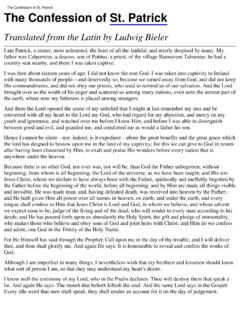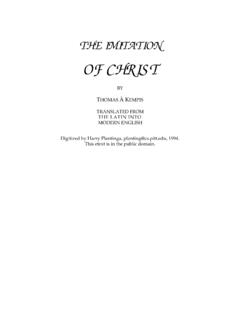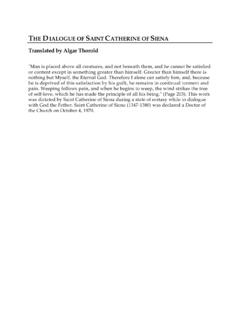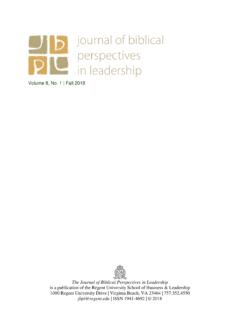Transcription of The Way of Perfection - Catholic Planet
1 The Way of PerfectionAlthough St. Teresa of Avila lived and wrote almost four centuries ago, hersuperbly inspiring classic on the practice of prayer is as fresh andmeaningful today as it was when she first wrote it. THE WAY OFPERFECTION is a practical guide to prayer setting forth the Saint's counselsand directives for the attainment of spiritual the entire work there runs the author's desire to teach a deep andlasting love of prayer beginning with a treatment of the three essentials ofthe prayer-filled life -- fraternal love, detachment from created things, andtrue humility. St. Teresa's counsels on these are not only the fruit of loftymental speculation, but of mature practical experience. The next sectiondevelops these ideas and brings the reader directly to the subjects of prayerand contemplation. St. Teresa then gives various maxims for the practice ofprayer and leads up to the topic which occupies the balance of the book -- adetailed and inspiring commentary on the Lord's all St.
2 Teresa's writings, THE WAY OF Perfection is the most easilyunderstood. Although it is a work of sublime mystical beauty, itsoutstanding hallmark is its simplicity which instructs, exhorts, and inspiresall those who are seeking a more perfect way of "I shall speak of nothing of which I have no experience, either in my own life or inobservation of others, or which the Lord has not taught me in prayer." -- PrologueAlmost four centuries have passed since St. Teresa of Avila, the great Spanish mysticand reformer, committed to writing the experiences which brought her to the highestdegree of sanctity. Her search for, and eventual union with, God have been recorded inher own world-renowned writings -- the autobiographical Life, the celebratedmasterpiece Interior Castle and The Way of Perfection -- as well as in the other numerousworks which flowed from her pen while she Way of Perfection was written during the height of controversy which raged over thereforms St.
3 Teresa enacted within the Carmelite Order. Its specific purpose was to serveas a guide in the practice of prayer and it sets forth her counsels and directives for theattainment of spiritual Perfection through prayer. It was composed by St. Teresa at theexpress command of her superiors, and was written during the late hours in order notto interfere with the day's already crowded doubt it fulfills the tribute given all St. Teresa's works by E. Allison Peers, theoutstanding authority on her writings: "Work of a sublime beauty bearing theineffaceable hallmark of genius."3 THE WAY OF PERFECTIONBYST. TERESA OF AVILATRANSLATED & EDITED BYE. ALLISON PEERSFROM THE CRITICAL EDITION OFP. SILVERIO DE SANTA TERESA, by Harry Plantinga, 1995 From the Image Books edition, 1964, ISBN 0-385-06539-6 This etext is in the public domainOnly a few of the nearly 1200 footnotes of the image book edition have beenreproduced. Most of those that were not reproduced concern differences between themanuscripts.
4 The student is referred to the print 'S NOTE:GENERAL ARGUMENTPROTESTATIONPROLOGUECHAPTER 1 -- Of the reason which moved me to found this convent in such strictobservanceCHAPTER 2 -- Treats of how the necessities of the body should be disregarded and of thegood that comes from povertyCHAPTER 3 -- Continues the subject begun in the first chapter and persuades the sistersto busy themselves constantly in beseeching God to help those who work for theChurch. Ends with an exclamatory prayerCHAPTER 4 -- Exhorts the nuns to keep their Rule and names three things which areimportant for the spiritual life. Describes the first of these three things, which islove of one's neighbour, and speaks of the harm which can be done by individualfriendshipsAPPENDIX TO CHAPTER 4 CHAPTER 5 -- Continues speaking of confessors. Explains why it is important that theyshould be learned menCHAPTER 6 -- Returns to the subject of perfect love, already begunCHAPTER 7 -- Treats of the same subject of spiritual love and gives certain counsels forgaining itCHAPTER 8 -- Treats of the great benefit of self-detachment, both interior and exterior.
5 From all things createdCHAPTER 9 -- Treats of the great blessing that shunning their relatives brings to thosewho have left the world and shows how by doing so they will find truer friendsCHAPTER 10 -- Teaches that detachment from the things aforementioned is insufficient ifwe are not detached from our own selves and that this virtue and humility gotogetherCHAPTER 11 -- Continues to treat of mortification and describes how it may be attainedin times of sicknessCHAPTER 12 -- Teaches that the true lover of God must care little for life and honourCHAPTER 13 -- Continues to treat of mortification and explains how one must renouncethe world's standards of wisdom in order to attain to true wisdomCHAPTER 14 -- Treats of the great importance of not professing anyone whose spirit iscontrary to the things aforementionedCHAPTER 15 -- Treats of the great advantage which comes from our not excusingourselves, even though we find we are unjustly condemnedCHAPTER 16 -- Describes the difference between Perfection in the lives of contemplativesand in the lives of those who are content with mental prayer.
6 Explains how it issometimes possible for God to raise a distracted soul to perfect contemplationand the reason for this. This chapter and that which comes next are to be notedcarefully5 CHAPTER 17 -- How not all souls are fitted for contemplation and how some take long toattain it. True humility will walk happily along the road by which the Lord leadsitCHAPTER 18 -- Continues the same subject and shows how much greater are the trials ofcontemplatives than those of actives. This chapter offers great consolation toactivesCHAPTER 19 -- Begins to treat of prayer. Addresses souls who cannot reason with theunderstandingCHAPTER 20 -- Describes how, in one way or another, we never lack consolation on theroad of prayer. Counsels the sisters to include this subject continually in theirconversationCHAPTER 21 -- Describes the great importance of setting out upon the practice of prayerwith firm resolution and of heeding no difficulties put in the way by the devilCHAPTER 22 -- Explains the meaning of mental prayerCHAPTER 23 -- Describes the importance of not turning back when one has set out uponthe way of prayer.
7 Repeats how necessary it is to be resoluteCHAPTER 24 -- Describes how vocal prayer may be practised with Perfection and howclosely allied it is to mental prayerCHAPTER 25 -- Describes the great gain which comes to a soul when it practises vocalprayer perfectly. Shows how God may raise it thence to things supernaturalCHAPTER 26 -- Continues the description of a method for recollecting the means of doing this. This chapter is very profitable for those who arebeginning prayerCHAPTER 27 -- Describes the great love shown us by the Lord in the first words of thePaternoster and the great importance of our making no account of good birth ifwe truly desire to be the daughters of GodCHAPTER 28 -- Describes the nature of the Prayer of Recollection and sets down some ofthe means by which we can make it a habitCHAPTER 29 - Continues to describe methods for achieving this Prayer of what little account we should make of being favoured by our superiorsCHAPTER 30 -- Describes the importance of understanding what we ask for in of these words in the Paternoster: "Sanctificetur nomen tuum, adveniatregnum tuum".
8 Applies them to the Prayer of Quiet, and begins the explanationof themCHAPTER 31 -- Continues the same subject. Explains what is meant by the Prayer ofQuiet. Gives several counsels to those who experience it. This chapter is verynoteworthyCHAPTER 32 -- Expounds these words of the Paternoster: "Fiat voluntas tua sicut in coeloet in terra." Describes how much is accomplished by those who repeat thesewords with full resolution and how well the Lord rewards them for itCHAPTER 33 -- Treats of our great need that the Lord should give us what we ask inthese words of the Paternoster: "Panem nostrum quotidianum da nobis hodie."CHAPTER 34 -- Continues the same subject. This is very suitable for reading after thereception of the Most Holy SacramentCHAPTER 35 -- Describes the recollection which should be practised after this subject with an exclamatory prayer to the Eternal FatherCHAPTER 36 -- Treats of these words in the Paternoster: "Dimitte nobis debita nostra"6 CHAPTER 37 -- Describes the excellence of this prayer called the Paternoster, and themany ways in which we shall find consolation in itCHAPTER 38 -- Treats of the great need which we have to beseech the Eternal Father togrant us what we ask in these words: "Et ne nos inducas in tentationem, sedlibera nos a malo.
9 " Explains certain temptations. This chapter is noteworthyCHAPTER 39 -- Continues the same subject and gives counsels concerning different kindsof temptation. Suggests two remedies by which we may be freed fromtemptationsCHAPTER 40 -- Describes how, by striving always to walk in the love and fear of God,we shall travel safely amid all these temptationsCHAPTER 41 -- Speaks of the fear of God and of how we must keep ourselves fromvenial sinsCHAPTER 42 -- Treats of these last words of the Paternoster: "Sed libera nos a " "But deliver us from evil. Amen."7 PRINCIPAL -- Authorized Version of the Bible (1611). -- Douai Version of the Bible (1609) .Letters -- Letters of St. Teresa. Unless otherwise stated, the numbering of the Lettersfollows Vols. VII-IX of P. Silverio. Letters (St.) indicates the translation of theBenedictines of Stanbrook (London, 1919-24, 4 vols.).Lewis -- The Life of St. Teresa of Jesus, etc., translated by David Lewis, 5th ed., with notesand introductions by the Very Rev.
10 Benedict Zimmerman, , London, Silverio -- Obras de Santa Teresa de Jes s, editadas y anotadas por el P. Silverio de SantaTeresa, , Durgos, 1915-24, 9 -- Francisco de Ribera, Vida de Santa Teresa de Jes s, Nueva ed. aumentada, conintroduction, etc., por el P. Jaime Pons, Barcelona, -- E. Allison Peers, Studies of the Spanish Mystics, London, 1927-30, 2 John of the Cross -- The Complete Works of Saint John of the Cross, Doctor of the Church,translated from the critical edition of P. Silverio de Santa Teresa, , and edited by Peers, London, 1934-35, 3 -- Diego de Yepes, Vida de Santa Teresa, Madrid, THE GRACIOUS MEMORY OFP. EDMUND GURDONSOMETIME PRIOR OF THE CARTHUSIAN MONASTERYOF MIRAFLORESA MAN OF GOD9 INTRODUCTIONWe owe this book, first and foremost, to the affectionate importunities of the Carmelitenuns of the Primitive Observance at vila, and, in the second place, to that outstandingDominican who was also St. Teresa's confessor, Fray Domingo B ez.









